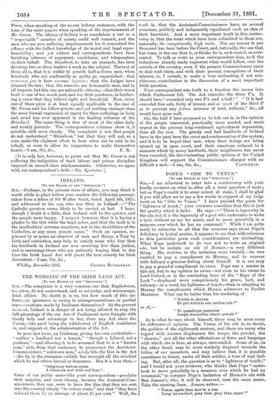THE WORKING OF THE IRISH LAND ACT. [To THE EDITOR
OF THE " SPECTATOR."]
SIR,—The complaint is a very common one that Englishmen, too often, do not understand, and so misjudge, and mismanage, Irish affairs. No doubt it is so, but how much of this un- fortunate ignorance is owing to misrepresentations, or partial repre-eutations, made by Irishmen themselves ? At the present momaut, Ireland is in danger of not being allowed to reap the full advantage of the one Act of Parliament more fraught with timely help and advantage to her, than any Act since the Union,—the peril being the withdrawal of English confidence in, and support of, the administration of the Act.
In your last issue, an Irishman, giving his own credentials-
" neither a landland nor a tenant," " though a I,Aiberal, not a partisan"—and allowing it to be assumed that he is a " known man," able, from that eminence, to pronounce the Assistant- Commissioners " unknown men," nicely hits the blot in the Act —the fly in the ointment—which has wrought all the mischief which he and others bewail or denounce. But it is true that,—
"Imaginary terrors scare
A timorous soul with real fear."
Some of our public men—like your correspondent—proclaim their surprise, and even dismay, because the Assistant-Com- missioners, they say, seem to have the idea that they are sent into the country simply " to reduce rents," and that "they have reduced them by an average of about 25 per cent." Well, the truth is, that the Assistant-Commissioners have, on several occasions, publicly and indignantly repudiated such an idea of their functions. And a more important truth in this contro- versy is, that the rents which have been submitted to them are, naturally, the exceptionally high rents. Not one tenant in one thousand has been before the Court, and, naturally, the one that has come, is the one that is, or thinks he is, rack-rented, or over- rented. To talk or write as your correspondent does, as if the reductions already made represent what would follow, over the rentals of the country, even if the present Commissioners came to deal with them, and with their present conceptions of their mission, is, I submit, to make a very misleading, if not mis- chievous, contribution to the discussion of a most important Irish question.
Your correspondent sets forth to a fraction the excess into which Parliament fell. The Act concedes the three F's. It should have " conceded only two F's and a half " " If it had conceded free sale, fixity of tenure, and so much of the third F as to prevent any future increase of rent, without," &c., all would have gone well.
Sir, the half F here proposed to be left out is, in the opinion of the people concerned, practically more needed, and more urgent in the present long-continued agricultural depression, than all the rest. The greedy and bad landlords of Ireland have in the past been the curse and condemnation of the system, and it is to be hoped that now, when their doings are being opened up in open court, and their exactions reduced to a measure which by many landlords, their neighbours, has never been exceeded, the discriminating public opinion of the United Kingdom will support the Commissioners charged with so' difficult a task.—I am, Sir, &c., ULSTERMAN.






































 Previous page
Previous page